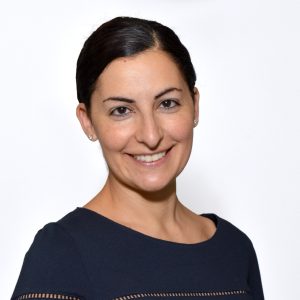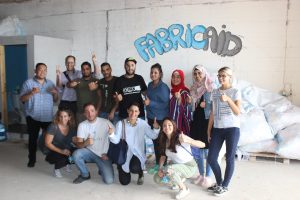Alfanar, founded two decades ago, was the first venture philanthropy organisation in the Arab region.
Myrna Atalla, who has been with the organisation as Executive Director since 2010, sat down with Alliance Regional Representative Heba Abou Shnief to catch up about funding the region and how venture philanthropy has fit into that landscape.
Heba Abou Shnief: Thank you for taking the time to talk to us about Alfanar’s pioneering work in the Arab region. Can you start by defining ‘venture philanthropy’ for us?

Myrna Atalla is the Executive Director of Alfanar, the first venture philanthropy organisation in the Arab region.
Myrna Atalla: Yes, absolutely. It’s one of my favourite questions to answer.
At the heart of it, venture philanthropy challenges the historic tendency for charitable givers and traditional funders to focus on hand-outs, short-term projects, activity-based budgets or inputs as sufficient for or even indicators of change.
Venture philanthropy is a long-term, strategic approach to philanthropic giving, which aims to drive lasting socio-economic and environmental change by empowering social purpose organisations ‘to fish sustainably and scalably’. It starts with clarifying the social, economic, environmental or other challenges it is seeking to address. For Alfanar, these lie in children’s education, youth unemployment, women’s economic empowerment and the environment in the Arab region. Like any strategic investor, venture philanthropists then search for promising social purpose organisations actively and credibly responding.
Before making funding decisions, venture philanthropists assess the track record and potential for impact growth of promising organisations. In Alfanar’s case, we focus on growing social enterprises and so we also examine their potential for financial self-sufficiency through the sale of goods or services. Following due diligence and an approval process, Alfanar’s venture philanthropy support begins delivering three core strategies:
1) Multi-year, tailored grants and zero-interest loans and equity, when appropriate;
2) Highly engaged management support, including Alfanar Sustainable Social Enterprise Training (ASSET), business planning and access to networks;
3) Alfanar Impact Management (AIM), which enables our investees to access business intelligence technology that eases the burden of impact monitoring and reporting while also using data to make better management decisions.
Over two decades, Alfanar has fundraised for and delivered £8 million in long-term funding and £4 million in capacity-building to 185 social enterprises, mostly in Egypt, Lebanon, Jordan, and Palestine, directly improving the lives of over 400,000 women, youth and children, and growing their impact by an average of 37 per cent. We have also enabled our investees to self-generate £18 million in revenue, with the portfolio today recovering an average 66 percent costs. With the support of hundreds of donors and partners who trust us with their philanthropy, we are proud to play a critical role in driving measurable change and strengthening the giving landscape.
HAS: Regarding your focus on growing social enterprises, can you give us an example of how an investment has stimulated scaled impact?

FabricAID is a social enterprise supported by Alfanar. Photo courtesy of Alfanar Venture Philanthropy.
MA: One example is Alfanar’s venture philanthropy support to the social enterprise FabricAID, which has become one of the largest second-hand clothing collectors and resellers in the Middle East and North Africa (MENA).
Originally established in Lebanon, FabricAID’s founder was struck by the inefficiency of textile recycling. With almost no designated donation locations in the country at the time, people were disposing of their clothes in landfills or donating them in disorganised ways.
FabricAID’s founder discovered that NGOs had warehouses of used clothes, but they didn’t know what to do with them. So, he began to create a more recycling value chain, setting up donation bins in key locations, establishing thrift shops, then barter shops, vintage shops and eventually an upcycled clothing brand.
When we began working with FabricAID in 2018, they had 15 employees. After providing three years of grant funding and management support, Alfanar made its first equity investment, contributing, alongside traditional investors, to the largest seed round raised by a social enterprise in the Arab region to date.
Now growing in Lebanon and Jordan and exploring the Gulf, FabricAID recycled 84 tonnes of used clothing, which resulted in a CO2 emission reduction of 302 tonnes last year alone. It has over 100 employees and has enabled 267,482 underprivileged customers to purchase affordable clothing in a dignified manner.
HAS: I’m curious, where does venture philanthropy fit in this ecosystem? Do you see yourself as a practice closer to the philanthropic space or the impact investing space?
MA: It’s been an evolution. We were established in 2004, the same year as Ashoka Arab World and Nahdet el Mahrousa, Egypt’s first social enterprise incubator. The word social enterprise wasn’t widely used, and there wasn’t as much acceptance for social purpose companies. In Egypt, NGOs were not allowed to engage in trading activity at the time. This has changed over time, and we have adapted to shifts in the landscape.
We sit between pure charity and impact investment delivering financial returns on investment to investors. There are two areas that distinguish Alfanar. We balance a focus on impact and financial sustainability for social enterprises, structuring our long-term funding and management support to help our investees measurably grow their reach on communities in need all while helping them bolster their trading revenue, and enhance their cost-recovery. We are incredibly serious about ensuring that the philanthropy entrusted us meaningfully helps social enterprises become lasting change agents so they can continue driving impact long after we exit.
The other distinguishing element of our venture philanthropy process is our management support. It’s the glue to our model and is so different to cheque-giving from an arm’s length away. It’s a lonely process to be a social entrepreneur, and funding is just one area of need. We have teams in Cairo, Beirut, and Amman who work closely with our social enterprises step-by-step throughout the investment cycle, as a social investor and a thought partner. From site visits to weekly accountability calls, tailored training to helping them track their impact – it’s a hands-on process.
HAS: I wanted to ask you how you can explain the key features that distinguish the region’s venture philanthropy landscape. I’ve noticed an emergence of many local social enterprises, and I was wondering if it is a demographic shift or a growing frustration with the lack of progress traditional NGOs have delivered on social, economic inequalities?
MA: Having had the great privilege of being Alfanar’s Executive Director for 14 years, I have been able see multiple trends emerging.
There is a greater appetite to establish social enterprises, for sure. The pool of investable entities has grown. Part of that is due to the general evolution of the movement globally. In India, Bangladesh, Ghana, South Africa, Kenya, social enterprises have been proving their ability to address long-standing challenges in sustainable, transformative ways.
It’s true that more people in the region are coming into the social change space, especially some of the younger generation who are justifiably frustrated at perpetual stagnation. These people are often deciding to establish social purpose companies rather than nonprofits, because they see their potential for agility, innovation and impact.
This is not to say that the older generation are not social entrepreneurs. There are some brilliant ones. But it’s also easier now to do this kind of work because the regulatory environment has changed. Going back to Egypt, the most recently passed NGO law now allows nonprofits to own subsidiary companies. We are working alongside other peers to help shape investment laws in Jordan to enable social enterprises to benefit from impact investment. Saudi Arabia has passed a social investment law.
Finally, and perhaps most crucially, there is also more capital available. Over the past 20 years, we’ve seen the growth foundations, corporate social responsibility, development aid, incubators, and accelerators focused on social enterprises. Even funds and the venture capital world in MENA are taking impact positions. Across the board, there are more pathways to set up and raise capital for social enterprises than ever before.
HSF: And how do traditional nonprofits fit into this changing landscape? Would you say that in the region today, people are setting up more social enterprises than nonprofits?
MA: I wouldn’t say that. There are many charities and nonprofits set up every day, because sadly, the Arab region continues to endure unbelievable challenges. It’s an assault on every single level.
The region suffers from a 60 per cent learning poverty rate – that’s over half of children who reach the age of 10 and cannot read an age-appropriate text. If we look at Palestine – 650,000 children in Gaza have not been in school for nearly a year now, not to mention the indescribable loss, suffering, and trauma they have experienced at every level. It leaves us asking: where do we go from here?
To address these kinds of challenges, distinct and complementary approaches are needed. Nonprofits are essential to delivering humanitarian aid. But we are also seeing the valuable role that social enterprises can play in emergency and crisis contexts. Social enterprises are a stabilising influence, because they are built to last and are thus responsive to evolving needs on the ground. Today, for example, Alfanar is bringing together both Palestinian and Lebanese education social enterprises to digitise the Palestinian primary curriculum and to get ready to support children both online and offline to access learning again. I’m proud that we can leverage our investments across the region and lean on each other in times of crisis – this is the importance of having a regional focus which is not just country-specific. This sort of innovative sleeve-rolling, borne out of suffering and incredibly challenging contexts, gives us hope in the face of so much anguish.
HAS: Does Alfanar typically respond to humanitarian crises and early recovery?
MA: In truth, venture philanthropy is not suited for humanitarian contexts. The long-term, patient nature of the approach requires a modicum of stability to render results. However, when crisis hits, we have learned how to leverage our teams on the ground, deep knowledge, broad networks and the expertise of our social enterprises.
We are also seeing the valuable role that social enterprises can play in emergency and crisis contexts. Social enterprises are a stabilising influence, because they are built to last and are thus responsive to evolving needs on the ground.
After the 2020 Beirut Port explosion – where 218 people died and over 6,000 were injured – many of our social enterprises were impacted, but many also wanted to respond. We had been working in Lebanon since 2012, so we decided to launch an appeal that enabled our food social enterprises to continue their work but in an emergency response manner. Our social enterprises not only delivered 278,684 meals and 2,520 food boxes, but also created 66 kitchen staff positions and 67 jobs with local food distributors.
In Palestine, since approving our first long-term investment in September 2023, we have continued to work with a social enterprise based in Ramallah called Flowless that has developed hardware/software solutions to enable farmers and municipalities to detect and respond to water leakages, and we’re enabling them to grow their impact beyond Palestine. We have had to be nimble, just like their team, in the face of war and crisis. But we have found that sometimes, the most disruptive thing you can do is stick to your mission just as your social enterprises are trying to do every day.
HAS: It’s definitely an important role you are playing as a venture philanthropy organisation. Can you speak a bit more about what’s in store for the future?
MA: There are opportunities for Alfanar to scale the impact of our social enterprises further, regionally and beyond. One exciting example is The Amal Project for Widows’ Empowerment, which provides widows in Egypt with affordable business microfinance. Meaning ‘hope’ in Arabic, Amal has enabled over 23,000 widows across 150 villages to increase their families’ income, on average, by 34 per cent. We’re now creating a social franchise of this model so we can continue expanding it across Egypt but replicate it in Lebanon and Palestine. Over the past five years, we have worked to support the emergence of an affiliated regional impact investment fund, which would be the first of its kind. My hope for the future is that Alfanar can continue growing the venture philanthropy movement to reach new countries in the Arab region, scale more social enterprises and impact more lives in a lasting manner. While the global narrative about the Arab region may be dismal, from our vantage point, there is so much innovation, grit and relentless determination to be proud of. I would love to see more stories of the heroic change-makers and social entrepreneurs we invest in across the Arab region make headlines.
Heba Abou Shnief is Alliance magazine’s Regional Representative for the Arab Region. She is also a socioeconomic development professional specialising in how strategic private philanthropy can best serve public development policy objectives, as well as a Senior Research & Data Director at the Arab Foundations Forum. She is a City University of New York (CUNY) Center on Philanthropy and Civil Society Senior International Fellow.








Comments (0)